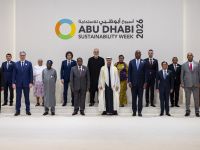OPEC Secretary General Rilwanu Lukman ruled out Wednesday any immediate intervention by the cartel to lower crude oil prices currently hovering around 10-year highs.
"It is not possible for OPEC to intervene every day and each time prices go up," Lukman told the Arabic-language London-based Asharq al-Awsat.
"OPEC will intervene when it sees there is a common interest" among its 11 member states -- Algeria, Indonesia, Iran, Iraq, Kuwait, Libya, Nigeria, Qatar, Saudi Arabia, the United Arab Emirates and Venezuela.
Lukman was referring to recent differences between Saudi Arabia, which said in July it was ready to hike production, and other members of the cartel, notably Iran and Venezuela.
Lukman rejected criticism of the Organisation of Petroleum Exporting Countries (OPEC) from industrialised nations following the rise in oil prices.
"Citizens of industrialised countries are hit by increasingly higher taxes on oil products. By blaming OPEC, the countries are looking to improve their image" before their people, the Nigerian said.
"At the end of the day, OPEC only receives around one-third" of the price paid by the final consumer of oil, Lukman added.
The cartel agreed at its March meeting on a price band mechanism that provides for an automatic output increase if the price of a basket of OPEC crudes remains above 28 dollars or below 22 dollars a barrel for 20 consecutive working days.
The current price of the basket has remained above 28 dollars for only five days, meaning that an increase would not likely be triggered before OPEC's ministerial conference scheduled for September 10 in Vienna.
Benchmark Brent crude for October delivery was trading in London at 31.20 dollars a barrel.
In New York on Monday, light sweet crude for September delivery climbed 48 cents to 32.47 dollars a barrel, as US stock levels remained around 24-year lows. – (AFP)
© Agence France Presse 2000
© 2000 Mena Report (www.menareport.com)








